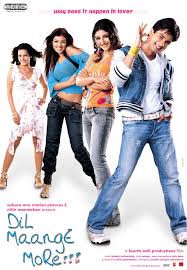Love triangles are tricky, but what happens when you’re juggling three love stories at once? Dil Maange More, a 2004 romantic comedy, throws its charming protagonist into a whirlwind of love, heartbreak, and hilarity. Starring Shahid Kapoor, Ayesha Takia, Soha Ali Khan, and Tulip Joshi, this film is set in the vibrant yet cozy town of Samarpur, capturing the ups and downs of young romance. As a light-hearted love story with comedic twists, it fits perfectly into the rom-com genre, while also touching on the chaos and confusion that accompanies the search for true love.
The story follows Nikhil (Shahid), an optimistic and cheerful young man, who is madly in love with Neha (Tulip), his high-school sweetheart. When Neha leaves for Mumbai to pursue her dreams of becoming an air hostess, Nikhil is devastated but hopeful that she’ll come back to him. However, life has other plans, and soon after, Nikhil meets Shagun (Ayesha) and Sara (Soha), two women who enter his life unexpectedly, both bringing their own unique charm and complications. As he tries to find stability in his love life, Nikhil is torn between past love, new possibilities, and the reality of who he truly wants to be with. The movie explores his journey of self-discovery and the humorous, sometimes painful, process of falling in love more than once.
Shahid carries the film with his natural boy-next-door charm. His performance as Nikhil is both endearing and relatable, capturing the youthful confusion of someone caught between multiple love interests. Shahid’s ability to switch between comedic timing and emotional depth allows the audience to empathize with Nikhil’s romantic struggles. He brings a certain vulnerability to his character, particularly in scenes where Nikhil is forced to confront the imperfections in his relationships. Tulip, Ayesha, and Soha, as the three leading ladies, all bring different flavors to the film. Ayesha, in particular, stands out with her vivacious energy as Shagun, who brings a fun, spontaneous dynamic to the story. Soha plays the more grounded and mature Sara, offering a contrast to the bubbly personalities of Neha and Shagun. The ensemble cast delivers solid performances, with a decent amount of chemistry that keeps the story engaging.
The direction by Anant Mahadevan is simple and straightforward, allowing the film to focus on the quirky charm of the characters rather than any complex narrative twists. He successfully maintains a light, breezy tone throughout, with moments of emotional sincerity sprinkled in. However, the film could have benefited from tighter pacing, especially in the middle, where some scenes feel repetitive and unnecessarily drawn out. The narrative occasionally stumbles as it tries to juggle too many characters and subplots, but Mahadevan manages to steer it back on course with a heartwarming and satisfying conclusion.
Cinematography plays a functional role in Dil Maange More, focusing more on capturing the warmth of small-town life rather than dazzling visual effects. The charming setting of Samarpur, with its picturesque hills and cozy town vibes, becomes an integral part of the film’s lighthearted mood. The shots are not overly ambitious but work well in showcasing the simplicity of Nikhil’s world. There are no elaborate special effects or grand visuals, but the film doesn’t need them—its strength lies in its characters and the everyday beauty of life in a small town.
Music by Himesh Reshammiya is another high point of the film. The soundtrack is a mix of peppy numbers and romantic ballads, with songs like “Gustakh Dil” and “Ha O Rabba” standing out for their catchy tunes and heartfelt lyrics. The music helps to enhance the emotional beats of the film, complementing both the lighthearted and dramatic moments. While not every song is memorable, the soundtrack does its job in adding a fun, youthful vibe to the film, making it a perfect fit for the rom-com genre. The musical sequences are simple, often taking place in familiar settings like parks or house parties, which helps maintain the film’s grounded, relatable feel.
Costume design in Dil Maange More reflects the early 2000s youth culture, with the characters sporting trendy, colorful outfits that fit their personalities. Shahid’s casual, laid-back wardrobe matches his boy-next-door persona, while the three leading ladies are each dressed to highlight their individual traits—Tulip’s Neha is more glamorous, Ayesha’s Shagun is playful and bold, and Soha’s Sara is more sophisticated and understated. The costumes add another layer to the characters, subtly reflecting their inner dynamics without overshadowing the story.
One element that deserves praise is the film’s editing, particularly the way it handles the intersecting love stories without making the plot feel overly convoluted. The transitions between Nikhil’s relationships are smooth, and the film manages to give each love story enough screen time without making it feel rushed. However, the editing does falter in certain areas, especially when the film drags out certain emotional conflicts for longer than necessary. A crisper edit could have trimmed down some of the repetitive scenes to keep the momentum flowing better.
Overall, Dil Maange More is a feel-good romantic comedy that succeeds in delivering light entertainment with a heart. Its charm lies in its simplicity, and while it doesn’t offer any groundbreaking insights into love or relationships, it provides a fun and relatable story about the complexities of the heart. Shahid shines as the lovable Nikhil, and the supporting cast adds enough flavor to keep the audience engaged. Though the film has its predictable moments, the charm of the actors and the feel-good music make it an enjoyable watch.
If you’re in the mood for a breezy, no-frills rom-com with some memorable performances and catchy tunes, this one is worth checking out. It may not leave a lasting impact, but it offers just enough lighthearted moments and romance to make it a fun addition to the genre. Fans of Shahid Kapoor and early 2000s Bollywood nostalgia will particularly enjoy this ride through love, loss, and laughter.







